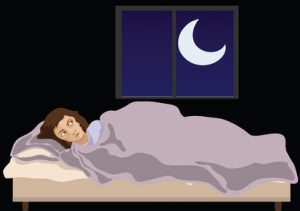 Numerous studies, many conducted just in the past year, have provided convincing evidence that lack of sleep is a risk factor for fat gain and obesity. A study from Finland published in the International Journal of Obesity revealed that various types of sleep problems such as difficulty falling asleep or staying asleep, were also associated with obesity. In a new development, this effect appeared in women, but not in men. More on that in a minute, but first a recap of what the research has told us so far…
Numerous studies, many conducted just in the past year, have provided convincing evidence that lack of sleep is a risk factor for fat gain and obesity. A study from Finland published in the International Journal of Obesity revealed that various types of sleep problems such as difficulty falling asleep or staying asleep, were also associated with obesity. In a new development, this effect appeared in women, but not in men. More on that in a minute, but first a recap of what the research has told us so far…
Previous studies have suggested that the reason for fat gain due to sleep curtailment may be largely due to hormonal factors that make you eat more and burn less.
Here are some of the consequences of sleep restriction related to body composition and obesity that are known so far:
- metabolic alterations
- endocrine alterations
- decreased glucose tolerance
- decreased insulin sensitivity
- increased evening concentrations of cortisol
- increased levels of ghrelin (hunger hormone)
- decreased levels of leptin (“anti starvation” hormone)
- increased hunger and appetite
A review study from the University of Chicago explained:
“Experimentally induced sleep loss in healthy volunteers decreases insulin sensitivity without adequate compensation in beta-cell function, resulting in impaired glucose tolerance and increased diabetes risk. Lack of sleep also down-regulates the satiety hormone leptin, up-regulates the appetite-stimulating hormone ghrelin, and increases hunger and food intake. Taken together with the epidemiologic evidence for an association between short sleep and the prevalence or incidence of diabetes mellitus and/or obesity, these results support a role for reduced sleep duration in the current epidemic of these metabolic disorders.”
Given the prevalence of sleep restriction today, combined with abundance of calorie dense and easily available fast food and the presence of eating triggers and high stress in today’s society, the fact that lack of sleep can increase appetite is an especially big concern
If the idea of insufficient sleep increasing the risk of fat gain doesn’t bother you, then how about losing your hard-earned muscle while dieting? A Dutch study last year found that getting an adequate quantity of sleep contibutes to the maintenance of lean body mass during times of decreased energy intake (dieting).
In the study titled, “Insufficient sleep undermines dietary efforts to reduce adiposity”, the researchers acknowledged that sleep loss can mess with both sides of the energy balance equation: increasing energy intake and decreasing energy expenditure. They wanted to find out whether sleep restriction makes these negative effects worse when you’re on a reduced-calorie diet. Not only was their hypothesis confirmed, they also made the disturbing discovery that with insufficient sleep, more of the weight loss comes from lean tissue:
“Sleep curtailment decreased the proportion of weight lost as fat by 55% (1.4 vs. 0.6 kg with 8.5 vs. 5.5 hours of sleep opportunity, respectively) and increased the loss of fat-free body mass by 60% (1.5 vs. 2.4 kg). This was accompanied by markers of enhanced neuroendocrine adaptation to caloric restriction, increased hunger, and a shift in relative substrate utilization toward oxidation of less fat.
It was concluded that the amount of human sleep contributes to maintaining fat-free body mass when calories are reduced while dieting. Lack of sleep can undermine your efforts to maintain your muscle while youre losing weight.
Evidence from Maastricht University researchers in the Netherlands revealed that sleep restriction could be contributing to the obesity crisis in children as well as adults.
They discovered that short sleep duration in children was related to insulin resistance, a higher body fat percentage, a higher waist circumference, decreased physical activity and increased TV watching.
This was alarming not only because of the increase in childhood obesity in recent years, but because this study also found that during the pubertal years, children/teens sleep about 2 hours less than the recommended amount.
Now, here’s the latest in the sleep – body fat story:
The recent Finnish study was a large scale, longitudinal cohort study of women and men (more women than men) conducted by survey over 5-7 years, with 8960 participants.
Participants were surveyed about sleep problems including:
- Trouble falling asleep
- Waking up several times per night
- Trouble staying asleep
- Waking up tired after normal nights sleep
Half the participants reported at least occasional sleep problems. 13-17% reported no sleep problems.
25% of the subjects gained 5 kg or more at the time of follow up. An increase of 5 kg or more was considered “major weight gain.”
Waking up tired after a normal night’s sleep was not associated with weight gain.
Problems falling asleep and problems staying asleep were associated with weight gain – and the association showed a dose-response relationship.
Of particular interest, the association of sleep problems and weight gain was found only among women and not men.
This was a survey study so it doesn’t show cause and effect, only associations. In fact, the gender differences may have simply been due to a larger proportion of the subjects being women (not enough men in the survey for strong statistical power).
However, these novel findings might raise an eyebrow among women who struggle with sleep problems and weight gain. It will be interesting to keep an eye out for new experimental research on the effects of sleep insufficiency and sleep problems exclusively in women.
Lack of sleep can affect us all, and it looks like certain sleep-related problems can be added to the list of factors that increase risk of weight gain. This new information suggests that women be especially diligent about taking steps to assure adequate sleep quantity and quality and address any sleep problems they have to the best of their ability.
Improving sleep habits has been the subject of entire books, but the suggestions below are among the most tried and true:
1. Sleep at least 7 and preferably 8 hours a night
2. Avoid oversleeping (studies show increased obesity risk with too much sleep as well as too little)
3. Go to bed and wake up at the same time every night
4. Get to bed early and get up early, if possible, to maximize sleeping nighttime (dark) hours and waking daylight hours
5. Sleep in a totally dark room
6. Avoid alcohol before bedtime
7. Avoid caffeine or other stimulants late in the day
Last but not least, you don’t see sleep aids on this list for a few reasons. One, I’m not an expert on sleep aids. Two, I’m not the type of person who recommends pill popping as a solution to every problem. Three, a recent sleep study in the journal Obesity Reviews expressed concern that people would read all this new information about the sleep-obesity correlation and use sleep aids as a crutch…
Recommendation: accomplish items one through seven above first before even thinking about what pill to take. Consult a doctor or health care professional if you have serious sleep problems.
Sweet dreams!
References:
Sleep problems and major weight gain: a follow-up study. Lyytikäinen P, et al, Int J Obes. 2011. 35: 109-114. Department of Public Health, University of Helsinki, Helsinki, Finland.
Insufficient sleep undermines dietary efforts to reduce adiposity. Nedeltcheva AV et al. Ann Intern Med. Oct 2010 5;153(7):435-4, The University of Chicago, Illinois, USA
Sleep duration and body-weight development during puberty in a Dutch children cohort. Rutters F, et al, Int J Obes. 2010 Oct;34(10):1508-14. Department of Human Biology, Maastricht University, The Netherlands.
Role of sleep duration in the regulation of glucose metabolism and appetite. Best Pract Res Clin Endocrinol Metab. 2010 24(5):687-702. Morselli, L et al, dept of medicine, University of Chicago.
Obesity and short sleep: Unlikely bedfellows? Horne J. Obesity Reviews. March 2011 (epub ahead of print). Loughborough University, UK.
About Tom Venuto
 Tom Venuto is a lifetime natural (steroid-free) bodybuilder, fitness writer and author of Burn The Fat, Feed The Muscle (e-book) and the national bestseller,The Body Fat Solution. Tom has appeared in The New York Times, Wall Street Journal, Oprah Magazine, Muscle & Fitness magazine, Men’s Fitness Magazine, as well as on dozens of radio shows including Sirius Satellite Radio, ESPN-1250 and WCBS. Tom is also the founder and CEO of the premier fat loss support community, the Burn The Fat Inner Circle
Tom Venuto is a lifetime natural (steroid-free) bodybuilder, fitness writer and author of Burn The Fat, Feed The Muscle (e-book) and the national bestseller,The Body Fat Solution. Tom has appeared in The New York Times, Wall Street Journal, Oprah Magazine, Muscle & Fitness magazine, Men’s Fitness Magazine, as well as on dozens of radio shows including Sirius Satellite Radio, ESPN-1250 and WCBS. Tom is also the founder and CEO of the premier fat loss support community, the Burn The Fat Inner Circle






Great article! Getting enough sleep is something I need to work on. I don’t suffer from trouble falling asleep, but rather, not-enough-hours-in-the-day syndrome. But I have to look at my sleep habits as I do my exercise and nutrition habits…essential to my good health!
Thanks Elaine. I used to be the same way – when I’d get into “hard driving, Type-A entrepreneur, ‘business-is-first priority’ mode, I would always say to myself, “there’s not enough hours in the day, too much to do to be sleeping the day away… plenty of time to sleep when I’m dead, etc etc etc. I managed ok, but knowing what I know now, and seeing all the research, If i wanted the absolute BEST results on a contest prep or any major fitness goal, I would not skimp on sleep again.
And I bet you find that you are more productive with fewer waking hours when you are properly rested! I am now shooting for 7 hours a night (vs. 6 a few months ago!). I’ll up my goal to 7.5 at the end of April…it’s progress, anyway!
True! and amazingly, the same is true when you take more entire days off from work. You work less, but when you do work, you’re more productive and end up getting more accomplished in less time. (thanks dan sullivan, for that)
Guess I need to read some more of the research (and convince myself to live by it) as I am stuck in the same spot right now…”not enough hours in the day, etc” mode. Feeling inspired lately with goals in mind but my mind keeps me awake racing with ideas for my writing and how I am going to work towards achieving my goals. Managing OK and still successful with making improvements in body composition, but admittedly I wonder if I got the sleep…
I am the same way! I find myself staying up to 12 A.M. most nights when I have to wake up at 6 A.M.! My goal is to start falling asleep by 9 P.M. to get at least 9 hours of sleep! But it’s so hard when you have two kids! lol!
– Sarah
I can attribute a vast majority of my weight gains over the years to lack of quality sleep. Question is, what comes first – chicken or egg, or in this discussion, snoring causing disruptive sleep or the weight gain? The second I’m able to sleep well enough, the weight goes away on its own seemingly overnight. Just as fast as the weight gain comes on.
For some of us who have bulging thyroids (sometimes referred to a goiter), we are at the mercy of thyroids closing off our throats as we relax into our REM stage, causing us to snore loudly and disruptively. It affects more than just us if we share a bed, or if loud enough a whole household. When I snore, it’s not nasal – I quite literally feel the vibrations in the base of my neck – and no pillow of sleeping position has been found to help thus far.
This is very dangerous on so many levels. The lack of sleep leads my body to hoard weight and to gain more, and the weight gain causes more constriction in my throat. Weight loss isn’t just something nice to do to fit into smaller clothes or even a contest to see how much I can lose in 6 wks. This is serious. This is a dangerous, vicious cycle; one my body has been holding me a victim of since I was 12.
The trick here for me is to keep moving, to keep reminding myself that I need to be five steps ahead of my own body. I need to do this, not just for me, but for my husband who doesn’t get sleep when I am snoring either, and he then feels tired and starts to gain weight himself and then his snoring kicks in.
We are in snoring hell over at my house some nights. :-) But, as long as I keep moving like a shark, I can keep the weight down and my snoring goes away. Every morning I wake up, i swallow to check for dryness and hoarseness, then take a look at myself in the mirror looking for signs of puffiness, redness and deep circles, and then I weight myself. Daily. I have to sit on top of this.
Anyone who sees themselves in my words needs to do the same. Weight loss is an imperative, not a luxury.
Oh, and another important part of getting great rest is also, of course, going to sleep at a descent hour so I can get all of my rest, not most of it. :-)
yes, and sleep apnea too, is a whole nother’ issue as well. Thanks
I just discovered that I have sleep apnea, thanks to my cardiologist questioning me about snoring and daytime drowsiness he ordered me to a sleep study and confirmed I do in fact have sleep apnea.
Now that I have become comfortable with my CPAP (Continuous Positive Airway Pressure) machine for a month I cannot believe the difference in how I feel during the day.
Daytime drowsiness is almost nonexistent, except for a couple of yawning incidents during the day, I no longer have the nodding off incidents at my computer or while sitting in long boring staff meetings. And yes the dangerous thing was long road trips, I’d have to stop and take a 30-40 minute nap in the middle of the trip to avoid falling asleep at the wheel.
Thanks to the discovery of my sleep apnea & CPAP treatment, I feel like a whole new person. Maybe I can now become the type of person that exercises very early in the morning while others sleep. With my prior wake up drowsiness problem I couldn’t see myself getting out of bed any earlier than I do now for work, which is already 4:30am. But that may change soon.
“There is nothing noble about not getting enough sleep.” Another article you all might find interesting – this one about lack of sleep and kids. http://www.cbc.ca/news/health/story/2011/03/18/world-sleep-day.html
“Sleep curtailment decreased the proportion of weight loss as fat by 55% (1.4 vs.0.6 kg with 8.5 vs. 5.5 hours of sleep opportunity, respectively) and increased the loss of fat-free body mass by 60% (1.5 vs.2.4 kg).”
Wow! Those figures above definitely caught my eye. If they are correct then a lack of sleep does undermine your fat loss efforts much more than I initially thought. This article is a great reminder to not only get more sleep but to sleep more soundly. Thanks Tom!
Tom,
You should right a blurb on EPOC or excess post oxygen consumption, being higher than many people thought. Here is the link to a article that recently appeared in a scientific journal. Dr. Nieman was able to quantify the afterburn effect of from a moderate intensity cardio session by having the participants sit in a metabolic chamber. I think this may be the first time that this type of study has been conducted.
http://peakperformance.runnersworld.com/2011/03/march-14-the-afterburn-exists-and-it-can-be-very-significant.html
I tend to have more problems with staying asleep and getting too much sleep. I wake up 2-5 times at night, and have since I was ‘potty trained’. It’s really irritating! On top of having a hard time staying asleep I seem to sleep too long. I have to stay up until 11pm or get up at the butt crack of dawn… grrrr! I’m learning, and that’s why I’m thankful for these articles.
Interesting article. Maybe that explains why I constantly fight the … battle of the bulge… as they say. I am a shift worker doing 4 12 hour shift rotations (4 days 4 off 4 nights.. 4 off..) Not only is my sleep an issue but so is sticking to a diet.
Derek, shift work and work at unusual hours brings its own set of unique challenges. The good news is, Ive had countless clients over the years express this concern, and they ended up getting superb results on a program of nutrition + weight training + cardio training + mental training (a dose of motivation and good attitude). Your hours may be long in shifts and nontraditional, but if you know your hours in advance, your schedule is easier to work around than someone whose daily schedule is totally unpredictable. So the key to your success is planning. dont worry so much about traditional rules about when you are supposed to eat, and just get on a schedule that you can follow consistently and put your focus on your calories and nutrition numbers for every 24 hour day… get the most restful, high-quality sleep you can… and Do that day after day and you;ll suceed
Hi Tom,
I have been following your blog and regularly refer back to my copy of Burn the Fat, Feed the Muscle. I am an avid endurance bicyclist. I am classified as a Clydesdale due to my size and I am acutely aware of the disadvantages of moving weight literally up mountains. Anything I can due to reduce body fat and improve my ratio of watts/KG is highly valuable.
I notice that much of what you comment on addresses the issues of body builders. What advise can you lend to endurance athletes where training sessions or races can last 4 – 8 hours, or more?
I look forward to your sage advise.
Mike
Mike, thanks for your post. yes most of my work is in bodybuilding, fat loss and body composition. Endurance sports is out of my area of expertise, but i have consulted with endurance athletes regarding helping them with their body composition. they have unique challenges as their energy expenditure is so high, but we find that the same rules for body composition improvement apply. we’re working with the same energy balance system, the equation is simply working at much higher levels of expenditure and intake. granted the carbohydrate requirements are far far above what they are for bodybuilders and strength athletes but much of the rest is similar: adequate protein intake is important and is above non athletes, but perhaps a bit below strength athletes, energy intake is the main thing although if fat loss is the goal you still need a caloric deficit. strength training will help, though the volume may be low. BFFM works but must be modified particularly for the carb and caloric intake, and for the long training sessions, during-workout nutrition also has to be considered. Would like to help more, but you’d be best served consulting an endurance nutritionist for this. Cheers!
Tom,
it’s funny, I just finished a guest post for thefatlossauthority.com/ , on exactly the same topic !;-)
It’s amazing how extremely important healthy sleep is for a long, healthy, quality life and not least for weight loss!
A kazillon scientific studies are backing up the importance of a good night’s rest for heart health, insulin sensitivity/prevention of diabetes, one study even went as far as advancing that lack of sleep leads to premature death!
Serious enough …
GREAT to see you keep up the good work, Tom !;-)
Thanks,
Mark
Nice conversation thanks for share this post keep sharing such unique ideas
Sleeping is def the key to success when it comes to diet and fitness. If you go to bed early you are less likely to binge at night and you will have way more energy to stick with your diet and exercise the following day. Simple as that!
Speaking of which, I really should go to sleep!
Tom
this may be a bit off topic, but what is your opinion on training each body part twice a week?
Hari, thats exactly what I recommend in some of my programs like HOly Grail body transformation program (www.HolyGrailBodyTransformation.com). Thats also a fairly standard set up for strength training and sports training (example 4 workouts a week, 2 upper body, 2 lower body or a similar split that works about half the body or half the lifts each session) Competitive level bodybuilders usually opt for splitting it up more however and working each muscle group once every 4-7 days rather than 2X per week. Different programs/ training frequencies for different people / different goals… there is no single best way, depends on your goals
I actually just commented on another one of your posts about how most people forget the sleep in the diet/exercise/sleep equation, and here you are with a post about it!
It’s really crucial to rest adequately Not getting enough sleep leads to a buildup of cortisol (which can lead to fat buildup around the midsection… aka what none of us want).
[…] Tom Venuto talks about Sleep Problems and Major Weight gain […]
Dear Mr. Venuto,
I’m having problems unsubscribing from receiving comments that are being posted on your BTF blog. Everytime I try, it keeps telling me something about an invalid key being entered. Is there anyway you can help me please? Thank you.
[…] night cooking frenzies and early morning cardio sessions, I had the misfortune of stumbling across this article by Tom Venuto posted in his Burn the Fat blog. It discusses the link researchers have made […]
Good article Tom, most of the people go through this I must follow the above tips.